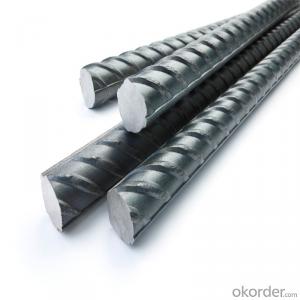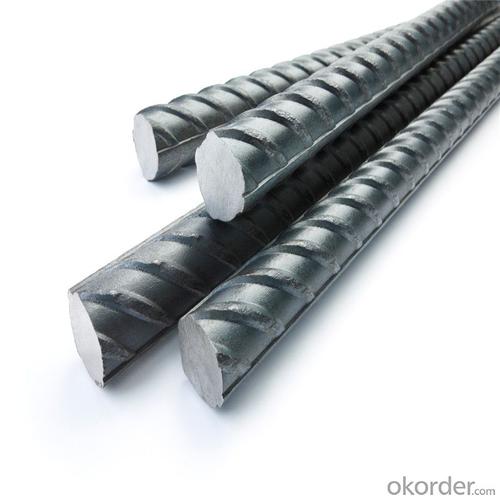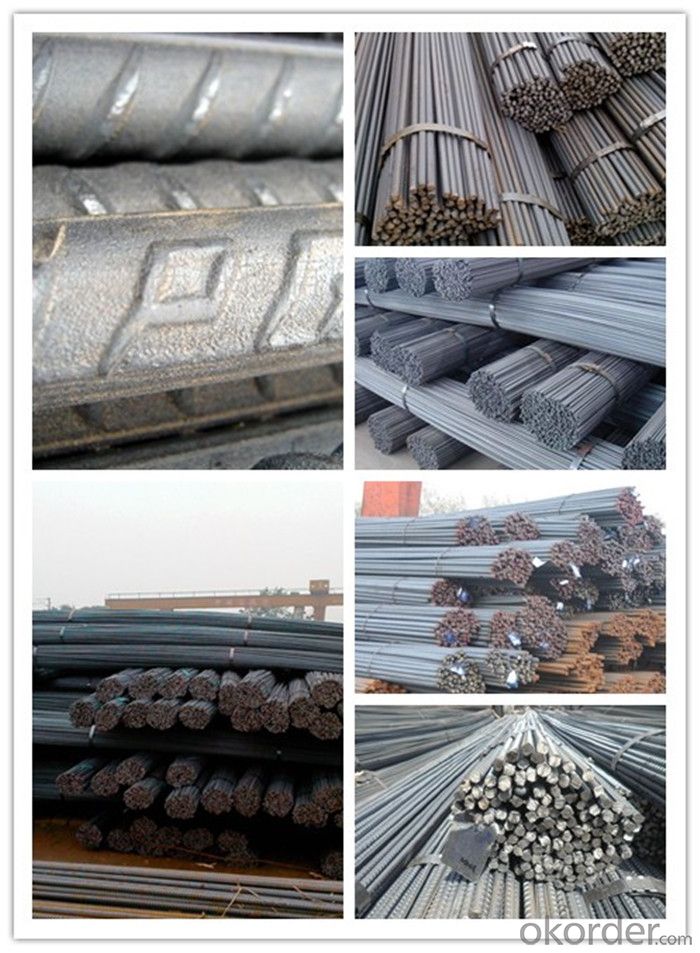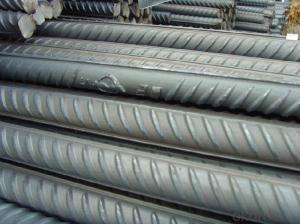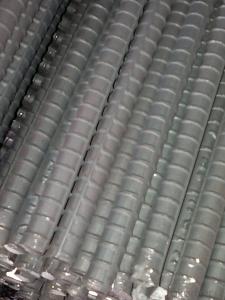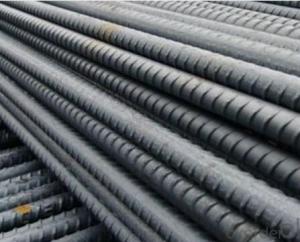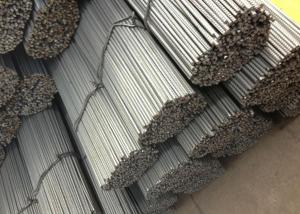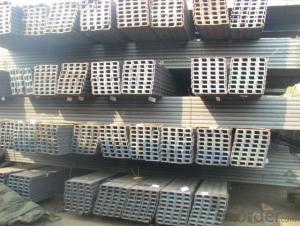Hot Rolled Steel Rebar and Cold Steel Rebar
- Loading Port:
- Tianjin
- Payment Terms:
- TT OR LC
- Min Order Qty:
- 100 m.t.
- Supply Capability:
- 50000 m.t./month
OKorder Service Pledge
OKorder Financial Service
You Might Also Like
Specification
Hot Rolled Steel Rebar and Cold Steel Rebar
Description of Hot Rolled Steel Rebar :
1, Diameter: 5.5mm-10mm rounds reinforcing steel bar
10m- 40mm Hot Rolled Steel Rebar
2, Length: 6m, 9m, 12m or customized
3, Standard: GB, ASTM, AISI, SAE, DIN, JIS, EN
OEM technology - send detailed technical parameters for accurate quotation.
2, Produce Process: smelt iron - EAF smelt billet - ESR smelt billet -
hot rolled or forged to get the steel round bar and plate
3, Heat Treatment: annealing, normalizing, tempering, quenching
4, Surface Treatment: Black
5, Quality Assurance: We accept third party inspection for all orders.
You can ask testing organizations such as SGS, BV, etc. to test our products before shipping.
Chemical Composition of Hot Rolled Steel Rebar :
Grade | Technical data of the original chemical composition(%) | |||||
Reinforcing steel bar HRB335 | C | Mn | Si | S | P | B |
≤0.25 | ≤1.60 | ≤0.80 | ≤0.045 | ≤0.045 | >0.0008 | |
Physics Capability | ||||||
Yield Strength(N/cm2) | Tensile Strength(N/cm2) | Elongation(%) | ||||
≥ 335 | ≥490 | ≥16 | ||||
Reinforcing steel bar HRB400 | C | Mn | Si | S | P | B |
≤0.25 | ≤0.16 | ≤0.80 | ≤0.045 | ≤0.045 | 0.04-0.12 | |
Physics Capability | ||||||
Yield Strength(N/cm2) | Tensile Strength(N/cm2) | Elongation(%) | ||||
≥ 400 | ≥ 570 | ≥ 14 | ||||
Product Show of Hot Rolled Steel Rebar :
Company Information:
CNBM International Corporation is the most important trading platform of CNBM group.
Whith its advantages, CNBM International are mainly concentrate on Cement, Glass, Iron and Steel, Ceramics industries and devotes herself for supplying high qulity series of refractories as well as technical consultancies and logistics solutions.

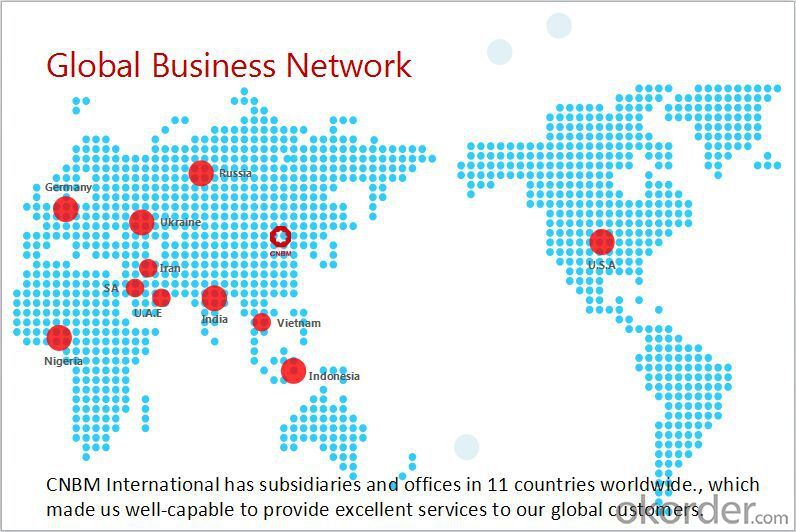
FAQ:
1, Your advantages?
professional products inquiry, products knowledge train (for agents), smooth goods delivery, excellent customer solution proposale
2, Test & Certificate?
SGS test is available, customer inspection before shipping is welcome, third party inspection is no problem
3, Factory or Trading Company?
CNBM is a trading company but we have so many protocol factories and CNBM works as a trading department of these factories. Also CNBM is the holding company of many factories.
4, Payment Terms?
30% TT as deposit and 70% before delivery.
Irrevocable L/C at sight.
5, Trading Terms?
EXW, FOB, CIF, FFR, CNF
6, After-sale Service?
CNBM provides the services and support you need for every step of our cooperation. We're the business partner you can trust.
For any problem, please kindly contact us at any your convenient time.
We'll reply you in our first priority within 24 hours.
- Q: What are the applications of special steel in the aerospace sector?
- Due to its exceptional properties and capabilities, special steel finds numerous applications in the aerospace sector. Firstly, it is utilized in the manufacturing of aircraft engines. Special steel's high strength and temperature resistance make it an ideal choice for components such as turbine blades and discs, which experience extreme heat and stress during operation. Moreover, special steel provides excellent corrosion resistance, ensuring the durability and reliability of vital engine parts. Another important application of special steel in the aerospace sector involves constructing aircraft structures. Special steel alloys are employed to fabricate landing gear, wing components, and other structural elements. The high strength-to-weight ratio of special steel enables the production of lightweight yet sturdy structures, contributing to fuel efficiency and overall performance. Special steel is also essential in producing aerospace fasteners, including bolts, nuts, and screws that secure various aircraft components together. Special steel's exceptional mechanical properties, fatigue resistance, and vibration resistance make it an ideal material for fasteners, ensuring the integrity and safety of aircraft assemblies. Furthermore, special steel is utilized in aerospace tooling and equipment. Tools used in the manufacturing process, such as cutting tools and molds, are often made from special steel. Its high hardness and wear resistance enable efficient and precise machining of aerospace components. Additionally, special steel is employed in the production of specialized equipment, such as test rigs, calibration devices, and ground support equipment, which are crucial for aerospace operations and maintenance. In conclusion, special steel plays a crucial role in the aerospace sector, contributing to the overall safety, performance, and reliability of aerospace systems. Its use in aircraft engines, structures, fasteners, and tooling is indispensable for the demanding and critical applications within the aerospace industry, thanks to its unique properties.
- Q: How is magnetic stainless steel used in the production of magnetic components?
- Magnetic stainless steel is used in the production of magnetic components due to its unique properties. It possesses both the corrosion resistance of stainless steel and the magnetic properties required for applications such as motors, transformers, and magnetic assemblies. The steel is typically alloyed with elements like nickel, manganese, and nitrogen, which enhance its magnetic properties. This allows for the manufacturing of reliable and efficient magnetic components that are resistant to rust and can withstand harsh environments.
- Q: How does special steel ensure product traceability?
- Special steel ensures product traceability through the implementation of unique identification codes, comprehensive record-keeping systems, and advanced tracking technologies. These measures enable manufacturers to accurately track and trace the entire lifecycle of the steel, from raw materials to the finished product. This ensures that any issues or defects can be identified and addressed promptly, enhancing quality control and customer satisfaction.
- Q: Can special steel be used in the mining industry?
- Yes, special steel can be used in the mining industry. Special steel, such as high-strength and wear-resistant steels, can be utilized for various applications in the mining industry, including the manufacturing of heavy machinery, equipment, and tools used in mining operations. These steels offer superior durability, strength, and resistance to abrasion, making them suitable for the harsh and demanding conditions present in mining environments.
- Q: What are the properties of weathering steel?
- Weathering steel, also known as corten steel, possesses several distinctive properties. It exhibits high resistance to corrosion, making it suitable for outdoor structures without the need for protective coatings. Its unique composition allows for the formation of a stable rust-like appearance, providing an aesthetically pleasing and natural finish. Moreover, weathering steel has excellent strength and durability, making it ideal for various applications, including bridges, buildings, and architectural elements.
- Q: What are the different methods of measuring the hardness of special steel?
- There are several methods of measuring the hardness of special steel, including the Rockwell hardness test, Vickers hardness test, Brinell hardness test, and the Knoop hardness test. These methods involve applying a specific force or load to a small area of the steel surface and measuring the depth or size of the resulting indentation. Each method has its own advantages and is suitable for different types of steel and specific applications.
- Q: What are the different production methods for special steel?
- Special steel can be produced using various methods, each with its unique advantages and characteristics. Some commonly used methods include: 1. Electric Arc Furnace (EAF): Scrap steel is melted in an electric arc furnace, where intense heat generated by an electric current melts the materials. EAF is known for its flexibility, as it can produce a wide range of steel grades and alloys. 2. Basic Oxygen Furnace (BOF): Molten iron from a blast furnace is combined with scrap steel and oxygen in this process to remove impurities and adjust the carbon content. BOF is famous for its high production capacity and the ability to produce large quantities of steel. 3. Vacuum Induction Melting (VIM): VIM is a method employed to produce high-quality and high-purity steel. It involves melting the raw materials in a vacuum environment to prevent contamination and achieve precise control over the alloy composition. 4. Continuous Casting: Molten steel is poured into a water-cooled mold in this method, which continuously produces solidified steel slabs, blooms, or billets. Continuous casting is efficient and capable of producing consistent and defect-free steel products. 5. Powder Metallurgy: Metal powders are compacted and sintered to produce steel with specific properties in this technique. Powder metallurgy enables the production of complex shapes, improved mechanical properties, and the incorporation of challenging-to-achieve alloying elements through traditional methods. 6. Additive Manufacturing (AM): AM, also known as 3D printing, is a relatively new method for producing special steel. It involves layer-by-layer deposition of metal powders, which are then fused together using heat or a laser. AM offers design freedom, the capability to produce complex geometries, and the potential for customized steel parts. Each production method possesses its advantages and limitations, and the selection depends on factors such as desired steel properties, production volume, cost considerations, and the specific requirements of the end-use application.
- Q: How does special steel perform in construction applications?
- Special steel performs exceptionally well in construction applications due to its superior strength, durability, and resistance to corrosion. It allows for the creation of structurally sound and long-lasting buildings, bridges, and other infrastructure. Additionally, its versatility and ability to be fabricated into various shapes and sizes make it highly suitable for a wide range of construction projects.
- Q: What is the role of chromium in special steel?
- Chromium plays a crucial role in special steel due to its unique properties and characteristics. It is primarily added to steel alloys to enhance their corrosion resistance, durability, and strength. One of the significant contributions of chromium is its ability to form a passive oxide layer on the surface of steel, known as chromium oxide. This oxide layer acts as a protective barrier, preventing the underlying steel from coming into contact with corrosive elements such as oxygen and moisture. This corrosion resistance makes chromium-containing steel highly suitable for applications in harsh environments, such as marine or chemical industries, where the material is exposed to corrosive agents. Furthermore, chromium also improves the mechanical properties of steel. It increases the steel's hardness, toughness, and wear resistance. This makes it valuable in manufacturing tools, machinery components, and other applications that require high strength and durability. Chromium also helps in retaining the steel's sharpness and edge retention, making it ideal for making high-quality knives and blades. Additionally, chromium is essential in heat-resistant steel alloys, as it significantly improves the material's ability to withstand high temperatures without losing its strength or shape. This makes it suitable for various applications, including turbine blades, exhaust systems, and aerospace components. In summary, chromium plays a vital role in special steel by enhancing its corrosion resistance, improving mechanical properties, and enabling it to withstand high temperatures. These properties make chromium-containing steel alloys highly versatile and valuable in a wide range of industries and applications.
- Q: Can special steel be machined easily?
- No, special steel is generally not easy to machine due to its higher hardness and strength compared to regular steel.
Send your message to us
Hot Rolled Steel Rebar and Cold Steel Rebar
- Loading Port:
- Tianjin
- Payment Terms:
- TT OR LC
- Min Order Qty:
- 100 m.t.
- Supply Capability:
- 50000 m.t./month
OKorder Service Pledge
OKorder Financial Service
Similar products
Hot products
Hot Searches
Related keywords
